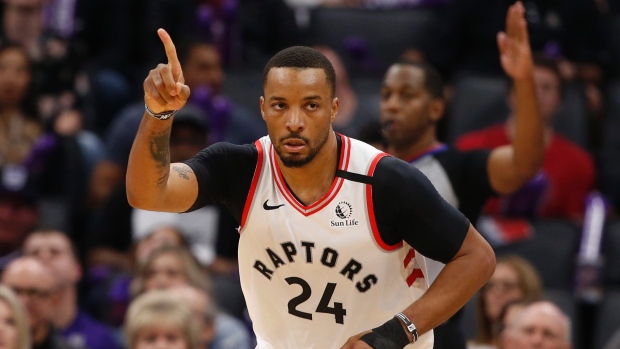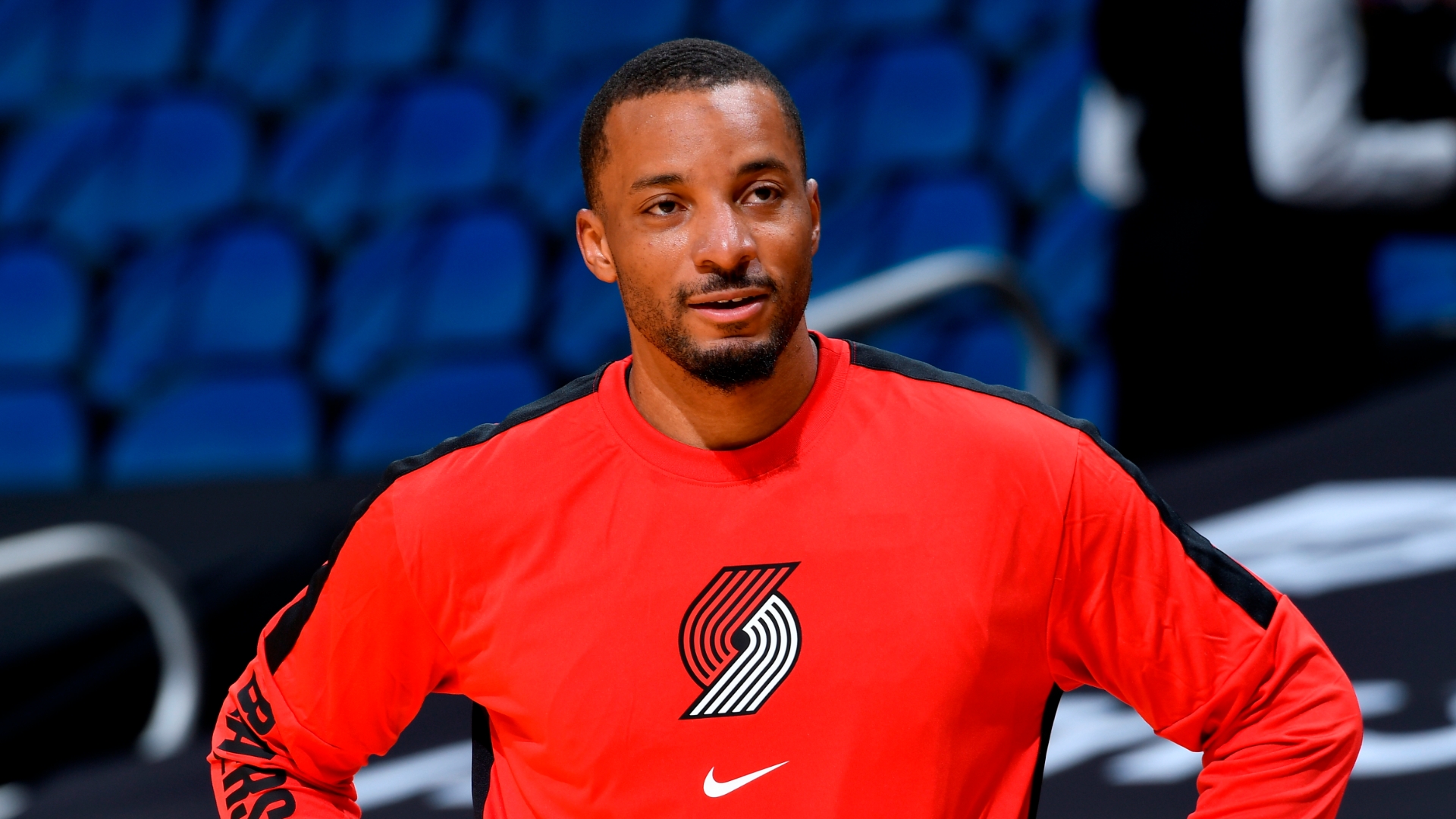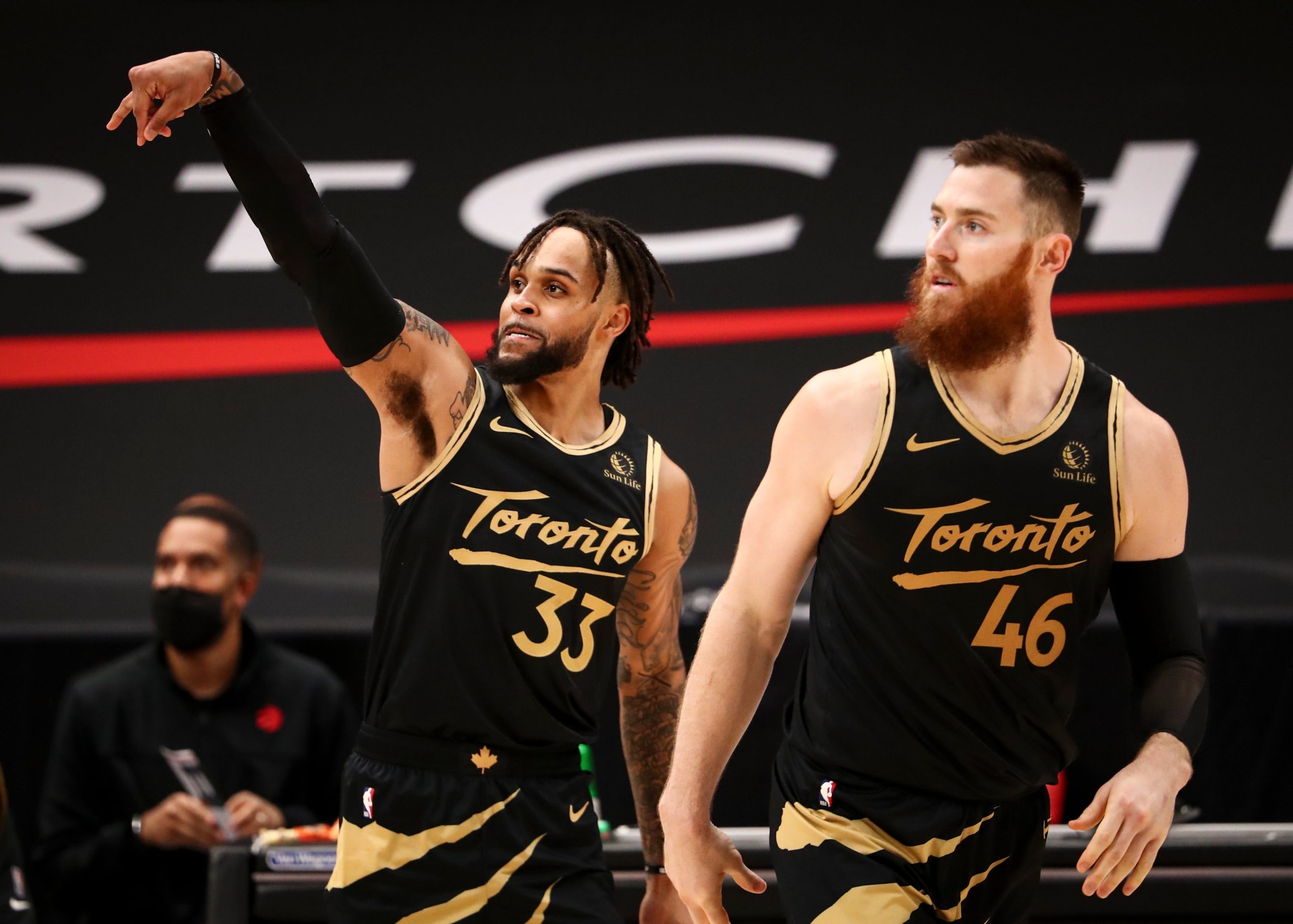Over his half-decade plus with the Toronto Raptors, Norman Powell evolved into one of the league’s premier specialists of the modern era.
Powell saw that shooting was his most important skill, and he built his game around that. His pet flare screen was first and foremost the threat of a catch-and-shoot jumper: a threat that, given Powell’s 46.0 percent from deep on 4.4 attempts this season, is more or less the deadliest in the league. If Powell couldn’t wrangle a spot-up shot out of his flare screen, but still caught behind the arc, he’d pivot into a pick and roll and usually try to fire from deep. Oh yeah, Powell shot 40.7 percent on pull-up threes this year. Again, death for defenders. If Powell couldn’t catch behind the arc, he’d curl around the screen and attack the rim, where he shot an excellent 63 percent this year.
Powell’s entire game was built around that one sequence. The flare screen, and his incredibly polished ability to create offense out of it. It surely wasn’t his entire game. He was an incredible standstill shooter in the corner, which was perhaps best showcased on Toronto’s hammer sets. He was a deadly scorer in transition. He became fantastic at ripping through during his gather towards the rim and drawing fouls. But those were derivatives of his ability in the flare screen. Powell was a meticulously scripted screenplay, whose every beat and cadence was written long before he took the court. He practiced like a maniac and built his game around that one sequence. He became a borderline offensive star because of his Coen Brother-mastery of the flare screen.
Before that, Powell was an acorn. He was buried on the bench for four seasons, never breaking 20 minutes a game. He existed as pure potential encased in a quick-twitch athletic body, miscast as a defensive stopper or an isolation scorer off the bench. At times he poked his head above water to summit the scoring column, tossing in threes, dunks, midrange pullups. Then he’d submerge again for an eight-minute, zero-point dud. Powell was raw, and for a specialist, raw doesn’t work. Not for extended periods of time.
When reporters bothered to ask Powell why he intermittently exploded, he always gave the same answer: opportunity. All he had to do was touch the ball, and he’d do something with it. That’s not to say he didn’t improve. He became a better shooter, better ball handler. Most of all, he became a better finisher, making him a better scorer. At times he peeked his leaves and branches above the ground, and those explosions are perhaps the most memorable aspects of Powell’s Raptors tenure; they always seemed to come in the playoffs. In his rookie year he picked off a pass to Paul George in game five against the Indiana Pacers and jumped too early, dunked it anyway, tied the game with only a few minutes left. The next year he scored 25 against the Milwaukee Bucks, also in game five. In Toronto’s championship playoff run, he scored 19 then 18 in games three and four against the Bucks. Powell’s role was always small, but he somehow found a way to insert himself at the biggest moments.
Give me a lever long enough, and I can lift the Earth. As long as Powell’s the fulcrum.
After Kawhi Leonard left, Powell’s explosions became more frequent. Slowly, they grew and grew until he was a 20 point per game scorer. It was a remarkable rise for a player who averaged between 4.7 and 6.7 points per game over his first four seasons. Last season, he came back from multiple shoulder injuries more consistent, smoother, and more polished. He bloomed, for good finally, realizing his potential based entirely around his masterful awareness of the flare screen.
Then this season Powell was too good on offense to keep off the court. He seemed to hit every shot he took, single-handedly keeping Toronto afloat when the stars were held out in the health and safety program. Toronto was not, unfortunately for Powell, able to win those games.
He had became Paul George on offense, albeit without the passing chops. A deadly shooter in every scenario. A lithe and devilish ball-handler who can annihilate lazy defenders or unaware but can’t dominate a fully locked-in and high-level defense without enough other threats on the floor. He’s blossomed into his full powers now, more oak than acorn, a professional three-tiered scorer who’s spent 10 000 hours on flare screen scoring, let alone the game of basketball.
And that is too rich for Toronto’s blood. The Raptors shelled out big money for three two-way stars in Pascal Siakam, OG Anunoby, and Fred VanVleet. They’re all improvisers, like Nick Nurse. They’re jazz musicians who are best at dynamic play, swinging on the fly, filling lanes, rotating, swapping positions. Powell has never been that. He’s become better at playing without an agreed-upon melody, but he’s best with a script. Always has been.
That’s not enough cause to ship someone out to Portland, but it’s a start. The real reason is that Toronto wasn’t winning enough games, and Powell was the guy with an expiring contract. If the Raptors had been fourth in the East — and they very well could have been without the unlucky timing of health and safety protocol — they may have decided to hold onto Powell at the trade deadline and and pony up some incredible number of millions of dollars to keep him on the team for the long-term. That clearly didn’t happen.
Powell did not want to be traded. He wanted to stay with the Raptors, with the only NBA team he’s ever known. With his friends. Instead Toronto traded younger, more defensive, and less expensive. That’s reality in the NBA. It may make sense, but we don’t have to like it.
As fans and media, we’ve only known Powell during the good years. The Raptors have never won fewer than 51 games with Powell on the team. He hasn’t been Kyle Lowry or DeMar DeRozan, but he’s firmly in the next tier down in terms of importance to the franchise. It’s not fair that his last game with the team was eulogized as Lowry’s last game, even though Powell was the only one to be traded.
Powell became a fan favourite over his career in Toronto. And fans never got a chance to say bye. His last game in Toronto was February 28, 2020. He scored 22 points.
Powell scored 22 points in his first game in Portland. It’s strange to see a player suit up for a franchise when he’s only known one for his entire NBA career. That doesn’t mean he’ll change much. He’ll continue his professional scoring in the Rose City. He’ll become a fan favourite in Portland in no time, if he isn’t already. He’ll improve even more; there’s no limit to how good you can be at scoring via the flare screen. But he’ll always be a Raptor — here for the salad days that climaxed in a championship and certainly not to blame for this season’s tumult. Goodbye Norman Powell. You’ll be missed.



